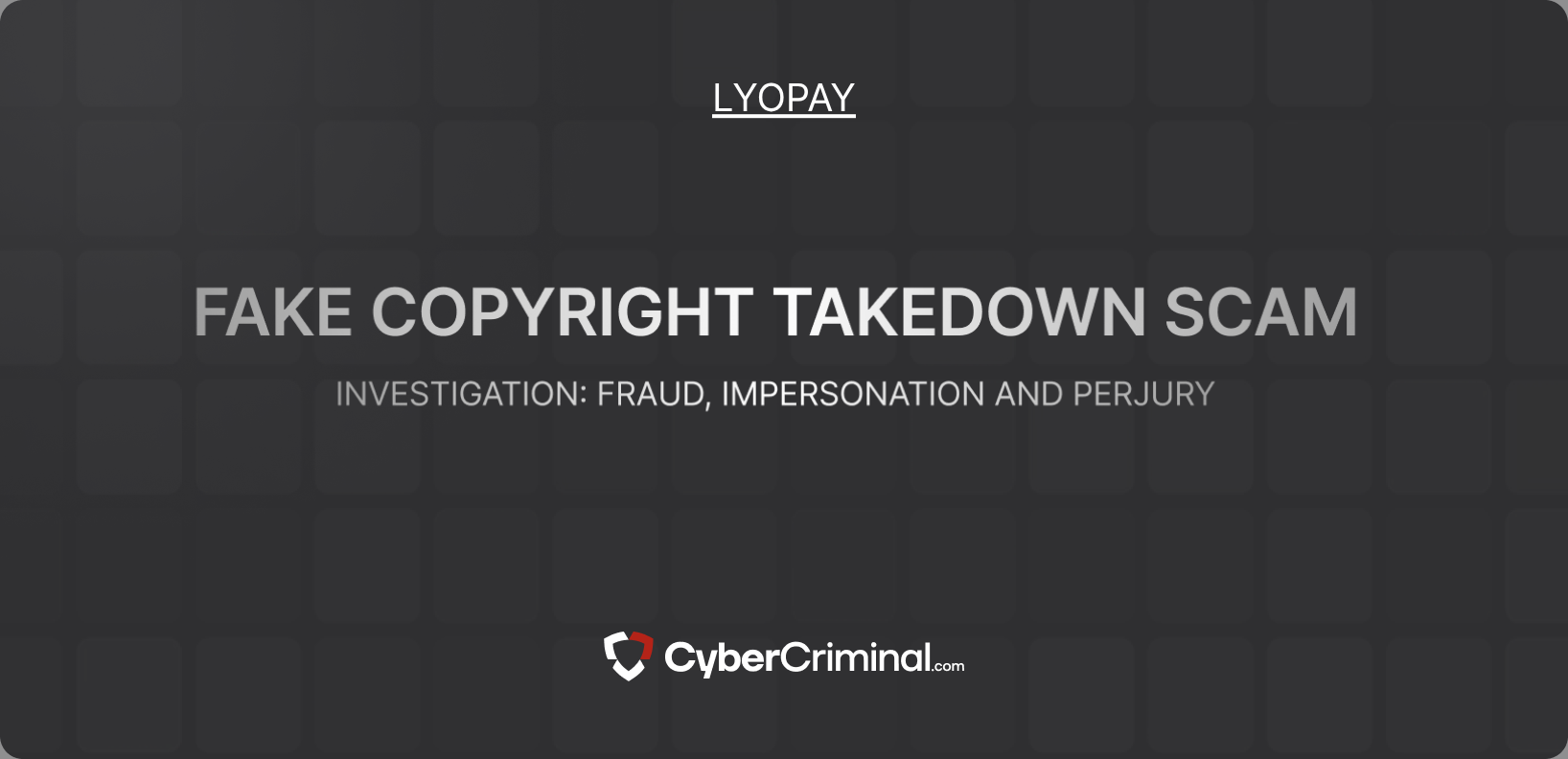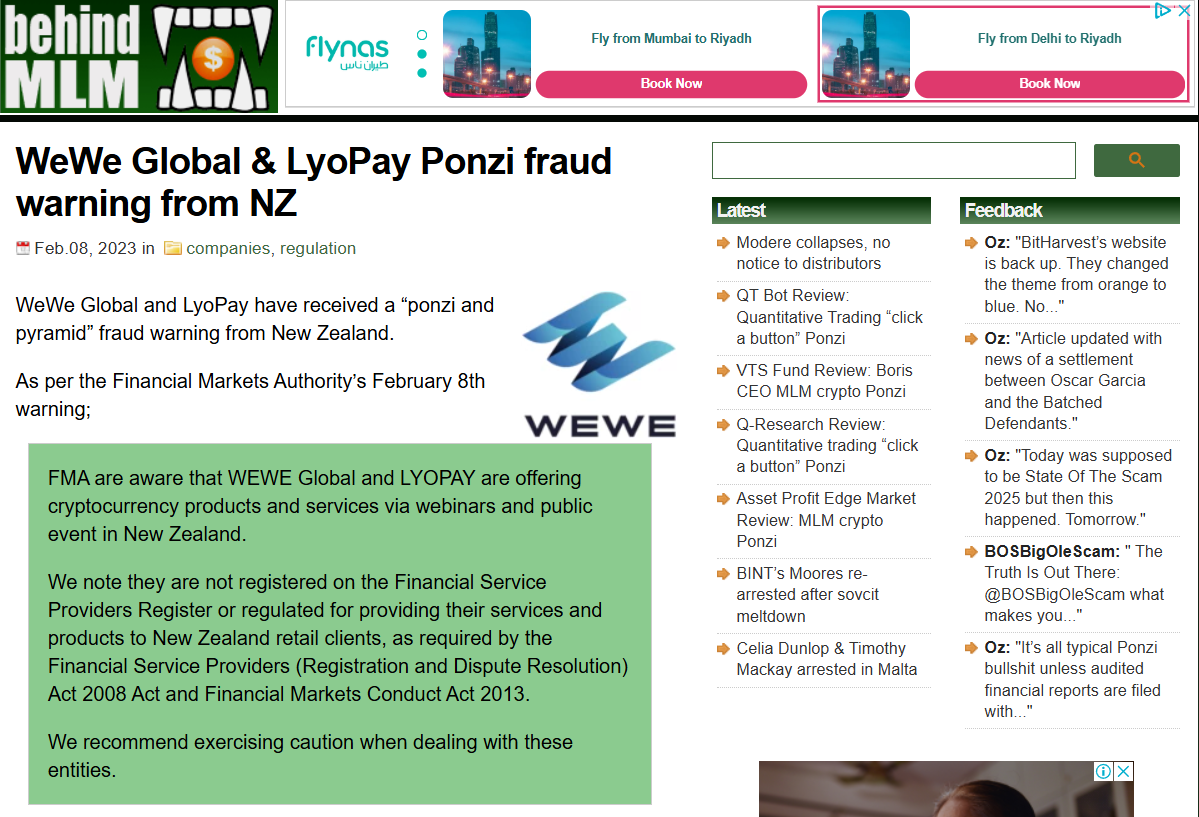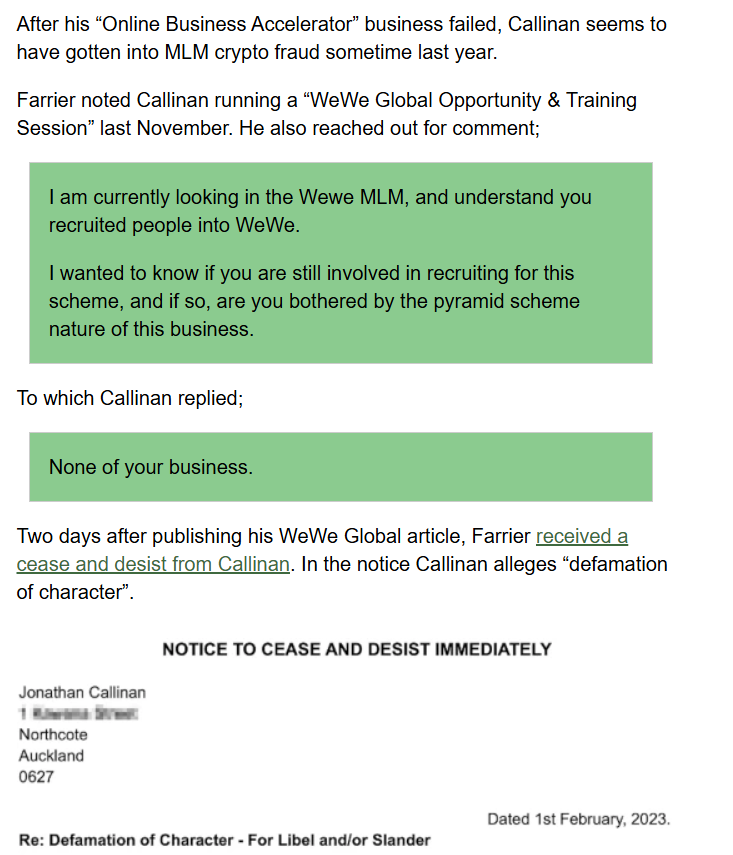- Home
- Investigations
- LyoPay

LyoPay
- Investigation status
- Ongoing
We are investigating LyoPay for allegedly attempting to conceal critical reviews and adverse news from Google by improperly submitting copyright takedown notices. This includes potential violations such as impersonation, fraud, and perjury.
- Company
-
LyoPay App Ltd
- Phone
-
0161 660 0579
- City
-
London
- Country
-
United Kingdom
- Allegations
-
Ponzi Scheme

- https://lumendatabase.org/notices/39259104
- Feb 06, 2024
- Jimmy Mathew
- https://www.tumblr.com/info-24/739771689888563200/wewe-global-lyopay-ponzi-fraud-warning-from-nz
- https://behindmlm.com/companies/wewe-global-lyopay-ponzi-fraud-warning-from-nz/
Evidence Box and Screenshots






How Was This Done?
The fake DMCA notices we found always use the ? back-dated article? technique. With this technique, the wrongful notice sender (or copier) creates a copy of a ? true original? article and back-dates it, creating a ? fake original? article (a copy of the true original) that, at first glance, appears to have been published before the true original.


What Happens Next?
The fake DMCA notices we found always use the ? back-dated article? technique. With this technique, the wrongful notice sender (or copier) creates a copy of a ? true original? article and back-dates it, creating a ? fake original? article (a copy of the true original) that, at first glance, appears to have been published before the true original.
01
Inform Google about the fake DMCA scam
Report the fraudulent DMCA takedown to Google, including any supporting evidence. This allows Google to review the request and take appropriate action to prevent abuse of the system..
02
Share findings with journalists and media
Distribute the findings to journalists and media outlets to raise public awareness. Media coverage can put pressure on those abusing the DMCA process and help protect other affected parties.
03
Inform Lumen Database
Submit the details of the fake DMCA notice to the Lumen Database to ensure the case is publicly documented. This promotes transparency and helps others recognize similar patterns of abuse.
04
File counter notice to reinstate articles
Submit a counter notice to Google or the relevant platform to restore any wrongfully removed articles. Ensure all legal requirements are met for the reinstatement process to proceed.
05
Increase exposure to critical articles
Re-share or promote the affected articles to recover visibility. Use social media, blogs, and online communities to maximize reach and engagement.
06
Expand investigation to identify similar fake DMCAs
Widen the scope of the investigation to uncover additional instances of fake DMCA notices. Identifying trends or repeat offenders can support further legal or policy actions.

Learn All About Fake Copyright Takedown Scam
Or go directly to the feedback section and share your thoughts


Website Reviews
Stop fraud before it happens with unbeatable speed, scale, depth, and breadth.
Recent Reviews

Cyber Investigation
Uncover hidden digital threats and secure your assets with our expert cyber investigation services.
Recent Reviews

Threat Alerts
Stay ahead of cyber threats with our daily list of the latest alerts and vulnerabilities.
Recent Reviews

Client Dashboard
Your trusted source for breaking news and insights on cybercrime and digital security trends.
Recent Reviews
Lincoln Lim...
Fake DMCA Investigation
Richard Liebowitz
Fake DMCA Investigation
Lee Kindlon
Fake DMCA Investigation
User Reviews
Discover what real users think about our service through their honest and unfiltered reviews.
1.6
Average Ratings
Based on 8 Ratings
Skylar Baxter
LYOPAY’s obsession with suppressing negative coverage proves they know the allegations are damaging and likely true. A legitimate company doesn’t fear transparency they fear exposure.
12
12
Rowan Morrow
The FMA didn’t just suggest caution they practically screamed it. Operating unlicensed while aggressively recruiting is a classic scam marker. Trusting LYOPAY is like playing roulette with your savings.
12
12
Nina Byrd
LYOPAY’s foundation isn’t built on tech or innovation it’s built on the backs of recruited victims in a Ponzi-style setup. They aren’t trying to disrupt finance they’re recycling scams under a crypto label.
12
12
Levi Bright
Their business model thrives on recruitment, not real value. If profits rely on new victims joining in, it’s not crypto innovation it’s a Ponzi playbook.
12
12
Maya Hebert
LYOPAY claims legitimacy, yet it’s flagged by regulators for Ponzi and pyramid operations. When you're selling hope instead of products, you're not a platform you’re a con.
12
12
Thabo Moeketsi
The structure is chaotic, and important facts are buried under opinion. No serious reader would take this as a legitimate source. It's a classic case of clickbait journalism.
12
12
Refilwe Dlamini
Nothing here is actionable or insightful— just vague accusations and guilt by association. If this is "investigative journalism," the bar is really low. Waste of time.
12
12
Lucia Conti
LYOPAY’s shady affiliations make it impossible to trust.
12
12
Donald West
I’ve been stuck in their app with locked funds for months. 😡
12
12
Avery Jenkins
Another crypto “ecosystem” that turned into a black hole for my funds.
12
12
Mason Bennett
The recruitment-based “business model” is classic Ponzi behavior. No real product, just hype and fresh victims funding the old ones. They always collapse. It’s just a matter of when.
12
12
Emma Carter
So many people can’t even get past cold verification. it is ridiculous! Accounts are being blocked, and users can’t access their assets. Support is no better, as every time you reach out, a different person handles your case.
12
12
Ivy Ross
his is why I don’t trust crypto influencers anymore.
12
12
You are Never Alone in Your Fight
Generate public support against the ones who wronged you!
Featured Cyber Investigations
Explore our most impactful cyber investigations, where we uncover coordinated digital deception, expose fraudulent takedown schemes, and reveal the hidden mechanics behind online manipulation.
Lincoln Lim...
Fake DMCA Investigation
Richard Liebowitz
Fake DMCA Investigation
Lee Kindlon
Fake DMCA Investigation
Reag Asset...
Fake DMCA Investigation
Kyaw Ny
Fake DMCA Investigation
M Kamal...
Fake DMCA Investigation
LiteFinance
Fake DMCA Investigation
Hüsnü Falyalı
Fake DMCA Investigation